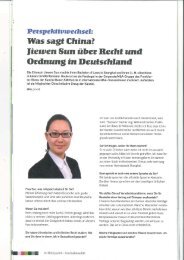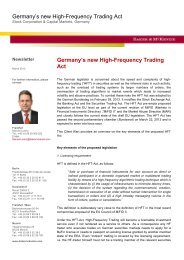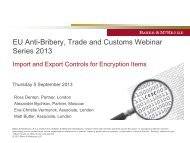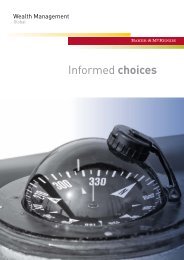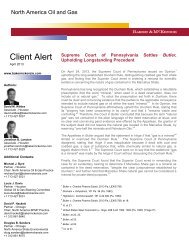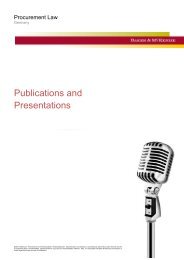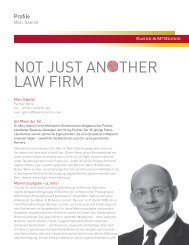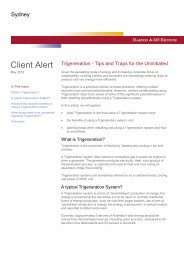Read publication - Baker & McKenzie
Read publication - Baker & McKenzie
Read publication - Baker & McKenzie
Create successful ePaper yourself
Turn your PDF publications into a flip-book with our unique Google optimized e-Paper software.
Canada<br />
iii Claimants<br />
The general rule is that only the taxpayer who is the subject of an assessment will object<br />
or appeal the assessment. 43 This coincides with the fact that most Canadian tax disputes<br />
concern direct taxes imposed on the assessed taxpayer. In contrast, in the case of indirect<br />
taxes such as the goods and services tax and the harmonised sales tax, the subject of<br />
the assessment is typically the supplier responsible for collecting the tax payable by the<br />
recipient of a taxable supply. 44 However, the law allows the CRA to assess either the<br />
supplier or the recipient where the supplier fails to collect tax on a particular supply. 45<br />
Where the supplier collects the tax but fails to remit it to the CRA, the recipient is<br />
relieved of any further obligation and cannot be assessed. 46 Where the supplier collects<br />
and remits an amount on account of tax that was not actually payable, the recipient (or<br />
the supplier, in limited circumstances) may seek a rebate from the CRA for the amount<br />
paid. 47 Any person who has been assessed may object and appeal from the assessment. 48<br />
Similarly, a resident making certain payments to a non-resident is responsible for<br />
withholding and remitting income tax to the CRA on the non-resident’s account, despite<br />
the fact that the non-resident is itself liable for the tax. 49 Where the resident payer fails<br />
to withhold and remit an amount on the non-resident’s behalf, the resident also becomes<br />
liable and will typically be assessed in respect of that same tax. 50 The assessed resident or<br />
non-resident may then follow the usual objection and appeal procedure under the Act.<br />
VI<br />
COSTS<br />
Canadian courts normally order an unsuccessful litigant to pay an amount to the<br />
successful party in respect of costs associated with bringing or responding to civil tax<br />
claims. 51 These discretionary awards provide only partial compensation to the successful<br />
party and often fall far short of the actual expenses incurred. However, an increased<br />
costs award may be made against a party that has acted in a reprehensible manner or<br />
43 Tax liability is normally considered to be a private matter between the taxpayer and the state.<br />
Nevertheless, it is possible for other interested parties to take part in the Canadian tax dispute<br />
resolution process in various ways, including as formal interveners in the course of judicial<br />
appeals.<br />
44 See, e.g., Excise Tax Act, R.S.C. 1985, c. E-15, s. 165(1) (‘ETA’).<br />
45 ETA, ibid., ss. 296(1)(a) (i.e., allows for the assessment of the supplier in respect of its ‘net tax’),<br />
296(1)(b) (i.e., allows for the assessment of the tax payable by the purchaser).<br />
46 See, e.g., Airport Auto Ltd v. Canada, 2003 TCC 683, 2003 G.T.C. 899-105.<br />
47 ETA, see note 44, s. 261.<br />
48 ETA, ibid., ss. 301(1.1), 302.<br />
49 See, e.g., Part XIII of the Act; especially ss. 212(1), 215(1).<br />
50 See ss. 215(6), 227(10).<br />
51 The Act also contains a rarely-used mechanism that permits the Tax Court to order a taxpayer<br />
to pay an additional 10 per cent of any amount disputed in an appeal where there were no<br />
reasonable grounds for the appeal, or where one of the main purposes for the appeal was to<br />
defer the payment of an amount payable (s. 179.1).<br />
31



